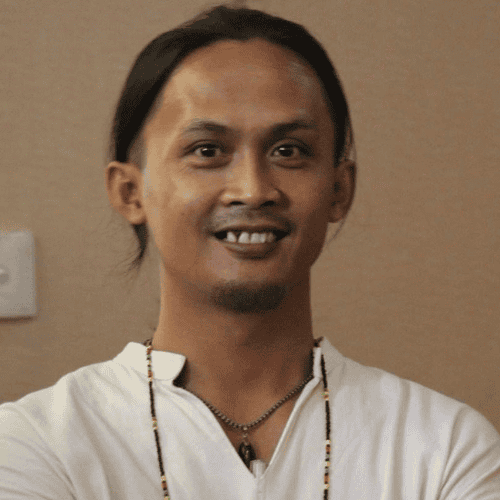
DTP alumni Imam Shofwan is an award winning Indonesian human rights defender, journalist and researcher. He is the Head of Community Network at Jaringan Advokasi Tambang (JATAM), a mining advocacy network comprising Indonesian non-governmental organisations (NGOs) and community groups dedicated to protecting mining workers, the environment, and the land rights of Indigenous peoples.
Imam has dedicated much of his life to addressing the human rights issues connected to mining in Indonesia. This includes advocacy for the rights of miners, as well as Indigenous Peoples rights and communities impacted by mining.
Mining workers face harsh treatment including arbitrary wage deductions, violence and constant surveillance. Communities have been negatively impacted by mining – with destruction and pollution of the environment – and their protests and advocacy for their lands has been criminalised. The mining industry in Indonesia has been poorly regulated and associated with corruption.
Imam works closely with grassroots communities affected by mining operations, defending communities from criminalisation, protecting Indigenous lands, and highlighting the environmental costs of mining activities.
JATAM amplifies the voices of marginalised communities, and advocates for legal and policy reforms for a future where Indigenous and human rights, including the human right to a healthy and sustainable environment, are protected.
“The DTP training also enhanced my ability to support grassroot movements as the training introduced me to the tools and strategies for amplifying community voices.”
Imam began his professional career in journalism, working for various media outlets, including Syir’ah Magazine and Pantau Feature Service. For over 20 years, he reported on pressing issues across Indonesia, covering conflict zones like Papua, East Timor, and Ambon, where he witnessed numerous human rights violations and injustices.
This experience sparked his transition into human rights advocacy. In recognition of his work for human rights in 2008, Imam was awarded Every Human Has Rights Media Award from Internews Europe and The Elders, Paris.
While he was already very experienced in advocacy, Imam said the DTP training was an “eye-opener” for him.
“DTP’s training broadened my understanding of civil and political rights. The training also taught me about the global mechanisms available to defend them, including protections offered by international bodies such as the United Nations.”
Recognising the importance of DTP’s training in his journey as a human rights advocate, Imam said that he highly recommends DTP’s training programs to fellow activists and believes that DTP could play a significant role in building awareness of civil rights in Indonesia.
Communities feel the impacts of mining in relation to their economic, social and cultural rights, and then experience restrictions and abuses of their civil and political rights when they try to make their voices heard, for example when opposing mining, or defending their lands.
Imam wants to ensure that the voices of the affected communities are heard. He also advocates for a comprehensive evaluation of the mining industry in Indonesia. Such an evaluation would have to include corruption and environmental degradation – and the powerful nexus between the government and mining companies.
Climate change and the requirement for decarbonization are bringing these issues into sharper focus. Indonesia is one of the world’s biggest producers of coal – and also of nickel. Its forests are critical to meeting global emissions targets.
Imam’s vision focuses on building sustainable grassroot movements in Indonesia to build stronger resilience. Imam believes that only through well-organised and coordinated efforts of advocacy and campaigns, meaningful change will be achieved in Indonesia. In Imam’s opinion DTP’s training has a continuing role to play in this change.
DTP acknowledges the traditional custodians of the land on which we work, the Bedegal people of the Eora Nation. We recognise their lands were never ceded, and we acknowledge their struggles for recognition and rights and pay our respects to the Elders – past, present – and the youth who are working towards a brighter tomorrow. This continent always was and always will be Aboriginal land.
Aboriginal and Torres Strait Islander peoples should be aware that this website contains images or names of people who have passed away.
DTP acknowledges the traditional custodians of the land on which we work, the Bedegal people of the Eora Nation. We recognise their lands were never ceded, and we acknowledge their struggles for recognition and rights and pay our respects to the Elders – past, present – and the youth who are working towards a brighter tomorrow. This continent always was and always will be Aboriginal land.
Aboriginal and Torres Strait Islander peoples should be aware that this website contains images or names of people who have passed away.
Privacy Policy | Terms of Use | Disclaimer | Policies
© 2022 Diplomacy Training Program | ABN 31 003 925 148 | Web Design by Studio Clvr